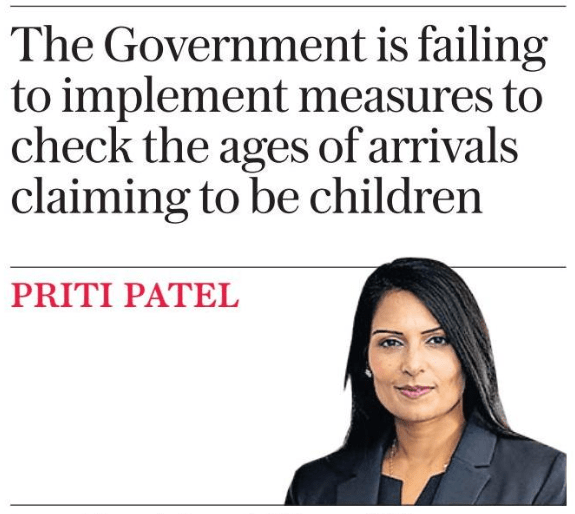
Fraudulent asylum seekers put all of us at risk
The vicious killing of Thomas Roberts, an aspiring Royal Marine, was a ghastly act of barbarity. The fact that it was committed at the hands of a liar who took advantage of this nation’s generosity, misleading officials about his age in order to be taken in as an asylum seeker, should jolt us into action. We must implement every law available to us now to stop adults from claiming asylum on the basis of a false age. They don’t just exploit our laws, but often children too, in the process of conducting this fraud.
Throughout my time as home secretary, I was always committed to protecting children and vulnerable people, in keeping with the traditions of our country. We open our arms to children in need.
In 2019, for instance, the UK received more asylum claims from unaccompanied children than any other European country, including Greece and Italy, who have dealt with particularly large waves of migration. Since 2015, the UK has received, on average, more than 3,000 unaccompanied asylum-seeking children per year. Those who claim we have a brutish policy, or that we somehow disregard those in need, are being dishonest at best.
But our generosity has also been open to egregious abuse. The ages of asylum seekers are disputed in many thousands of cases. Worse yet, during the 2016-2020 period, some 54 per cent of disputed cases who claimed to be a child were found to be adults.
For years I have stressed how serious a risk this poses in terms of safeguarding. If people aged over 18 are placed in childhood settings, including schools, the dangers should be obvious. And yet, as Thomas Roberts’s tragic killing has proven, it was never just the safety of the young that was at stake. Everyone’s security is compromised if those who lie so fundamentally about their nature are allowed to abuse our systems and institutions.
There’s a lot we can do now to fix it. The UK is one of the only countries in Europe not to use scientific age assessment methods to help determine a person’s age when they arrive into the country. Various scientific methods are used to assess age in, among others, Sweden, Norway, France, Germany and the Netherlands.
The Nationality and Borders Act 2022, introduced under Boris Johnson’s administration and during my tenure at the Home Office – which has yet to be implemented by this Government – brought in important changes to strengthen and clarify the framework for determining the age of people seeking asylum. It brought forward plans to introduce a new National Age Assessment Board (NAAB) to set out the criteria, process and requirements to assess age, including using the most up to date scientific technology.
This legislation – if implemented –should also enable front-line immigration officers and other staff who are not social workers to make reasonable initial assessments of age. Moreover, it would provide a requirement on local authorities to either undertake full age assessments or refer people to the Age Assessment Board for a full statutory assessment, when they have reason to believe that someone’s age is being incorrectly given, in line with existing safeguarding obligations.
The problem with the current process is that it is highly subjective and often subject to prolonged and expensive legal disputes. In some cases, multiple assessments are required before confirming whether an individual is a child or not. The cost of repeated assessments and legal challenges can exceed thousands of pounds of public money. The result is prolonged uncertainty over many months, sometimes years.
During such delays, we have examples of adults freely entering the UK care and school system, and being accommodated and educated with vulnerable children. The Nationality and Borders Act was designed to overhaul the process in order to avoid this. It could provide a consistent and robust approach to dealing with anyone whose age is uncertain. But only if it is implemented.
Everyone across Government should work together to now put this tough legislation into action. It is a matter of national urgency.
Priti’s comments for the Daily Telegraph on the risk posed by fraudulent asylum seekers.